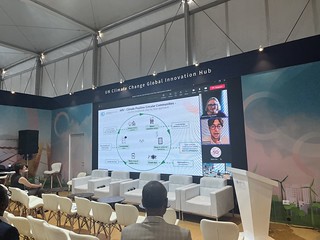Echoing my thoughts from earlier in the week, my gratitude as well as my perspective has only grown after participating in a full week of discussion, presentations, and negotiations at COP27. The Conference of Parties allows for a unique insight into the forefront of climate conversations and innovation. While it may seem as though people are acting independently in regard to sustainability and addressing climate change, ideally there are larger frameworks behind the actions of individuals, nations, and actors.
The major framework present at COP is the goals set by each country, which are self-determined and administered in the form of Nationally Determined Contributions, NDCs. NDCs are living documents that each nation in the Paris Agreement draft that outline their individual goals in regard to their reducing their contributions to climate change. I had the opportunity to hear further about the opportunities for partnerships between the U.S. and developing nations while attending events that included speakers from the NDC partnership. While there are mechanisms for support associated with the NDCs, there is no true accountability. This can lead to the creation of ambitious goals, with little action. Especially when nations in the Global North seem to be offsetting responsibility, by aiding developing nations that ultimately have much smaller carbon footprints rather than minimizing their emissions and recognizing their massive contributions to the climate crisis. To date, the NDCs have been the most successful framework for climate action than a climate conference, but there are flaws that stall progress.
Another framework that I was able to see was the urban implementation cookbook. On the last day, I attended “Taste Test: a First Look-back on the Urban Implementation Cookbook” at the UN Global Innovation Hub. It explained urban planning and creating sustainable cities through a cooking metaphor. The metaphor is intended to be an accessible and universal framework that can be applied at various scales. It includes conceptualizing the menu, accessing kitchen capacity, selecting an adaptable recipe, shopping for additional ingredients, creating the dish, sharing the recipe, and updating the menu. The framework itself is cyclical in nature, so it can be applied no matter the stage of the project. I found the presentation fascinating, but there was a lag between the creation of this framework and having access to true resources. There also seemed to be minimal pathways to collaboration and implementation. When I had a chance to speak shortly with one of the panelists following the event they mentioned building intercity collaboration as a next step. Within the presentation itself they highlighted that they hope to have further scaling of the framework itself by COP28. While there seems to be a commitment to progress and advancement there needs to be a greater sense of urgency and immediate action.
I found that these two examples of frameworks are indicative of the larger outcomes of the conference, while there is a large amount of discussion of potential pathways and determination of potential options there need to be subsequent, and rapid implementation. Now there are comprehensive frameworks in place, and we are now in a position where there needs to be collective international action to make true progress. As someone who is interested in the intersections of environmental science and policy, these frameworks seem to lack a regulatory structure or mechanism to ensure compliance or measure progress. That is a challenge with a wicked problem, like climate change. There are many different actors and since it is a global problem, there is no one enforceable regulatory body, with legislative capacities, that can ensure compliance. We are reaching a critical point that will hopefully lead to action and compliance on the part of individual nations. I have left the conference with a greater sense of urgency, but also a better understanding of the truly complex nature of international relations. Attending COP27 will be an experience that will undoubtedly impact the rest of my life and has encouraged me to think about sustainability in a broader context, but also to be critical of the current structures in place and expect more of world leaders.